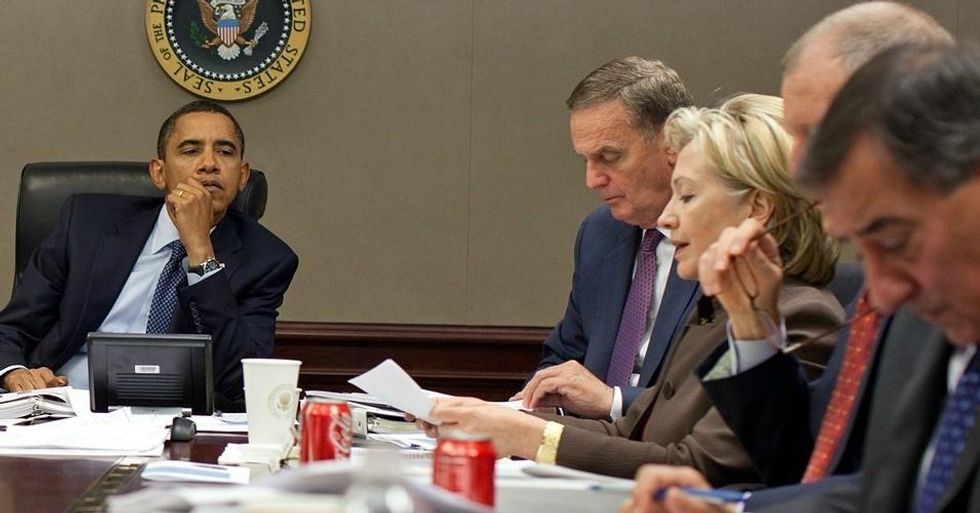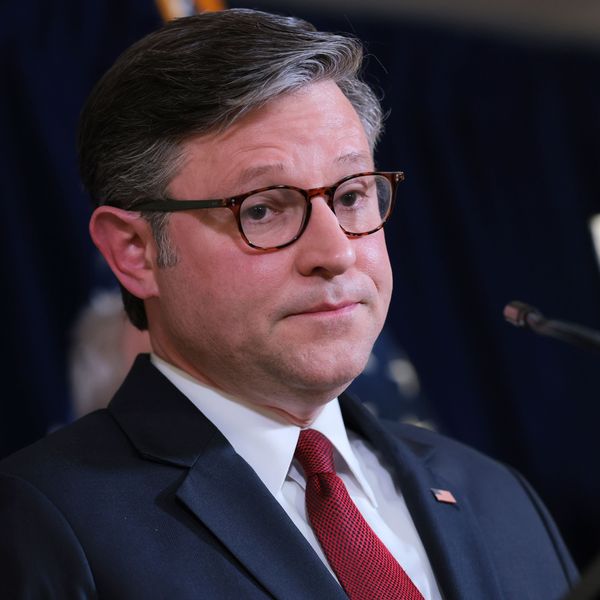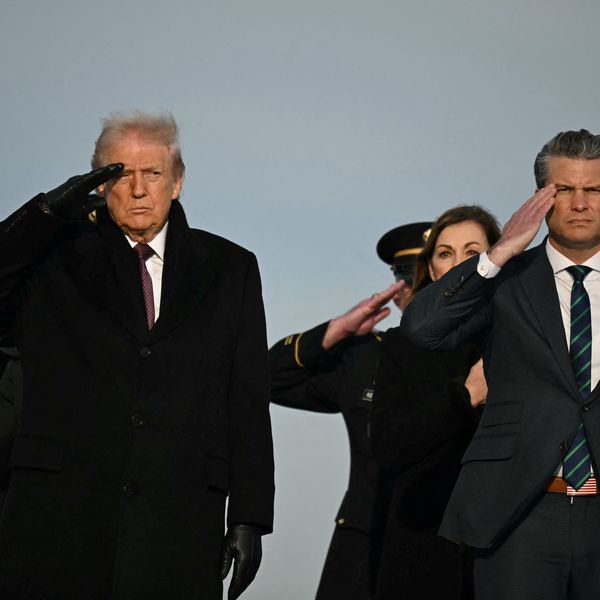Survivor of US Drone Attack: Obama Belongs on List of World's Tyrants
'I am the living example of what drones are,' says Pakistani who was just a boy when U.S. missile struck his family's home
"It's not about me. It's about every civilian who has been killed in Waziristan."
Those are the words of Faheem Qureshi who was just a young boy in 2009 when a U.S. drone, on the orders of a newly-elected President Barack Obama, fired a missile that slammed into his uncle's home in the Waziristan region of Pakistan where family and friends were gathered. Though others in the house were not, Qureshi was lucky to survive.
"What we know of the US is this is what they do to people like me. They uproot us, they kill us, they target us, without any reason. They turn our lives upside down. Of course the US is hated in that part of the world, and it's hated more because of what they've done to people like me." -- Faheem Qureshi
As the Guardian's Spencer Ackerman reports Saturday:
It took nearly 40 days for Qureshi to emerge from a series of hospitals, all of which he spent in darkness. Shrapnel had punctured his stomach. Lacerations covered much of his upper body. Doctors operated on the entire left side of his body, which had sustained burns, and used laser surgery to repair his right eye. They could not save his left.
His family kept the worst from him while he recuperated. Two of Qureshi's uncles, Mohammed Khalil and Mansoor Rehman, were dead. So was his 21-year-old cousin Aizazur Rehman Qureshi, who was preparing to leave the family's North Waziristan home for work, also in the UAE. Fourteen of Qureshi's cousins were left fatherless.
Barely a teenager, Qureshi was suddenly an elder male within his family, tasked with providing for his mother, brothers and sisters. Once a promising student who wanted a career in chemistry, his priority would become scrounging a living. The family never had the money to repair the guest lounge.
Obama, now in the twilight of his presidency, wants to be remembered as a peacemaker. In his own telling, as in his final state of the union address earlier this month, he is the man who denuclearized Iran peacefully, who opened Cuba and ended the last vestige of the cold war, who replaced the "dumb wars" he campaigned against with the prudent, precise counter-terrorism of drone strikes.

Now approximately 21-years-old (he doesn't know his exact age), Qureshi has given his first interview with a western journalist in order to let the world know the damage the U.S. drone program has done to his life and those of others in the remote areas of Pakistan that have experienced the most aggressive attacks under the Obama presidency.
"There are so many people like me in Waziristan that I know of who were targeted and killed who had nothing to do with militancy or the Taliban. So many women who have been killed, children who have been killed, but there is still no answer to this. Forget about the answers, there is not even acknowledgement that we were killed."
"If there is a list of tyrants in the world, to me," Qureshi told Ackerman through a translator, "Obama will be put on that list by his drone program."
As Ackerman reports, Qureshi's experience stands out not only because the attack which took one of his eyes and nearly killed him is believed to be first every ordered by President Obama, but also because it, like many others, killed and wounded many innocent people while missing its intended target:
The available evidence suggests the strike was an error. Reporter Daniel Klaidman's book about Obama's drone strikes, Kill or Capture, claims that the first January 2009 strike had gone "terribly wrong", with the targeted Taliban member never having been on the premises. A leaked Pakistani government document records "9 civilians" being killed in a drone strike on 23 January 2009, an apparent reference to the one on Qureshi's home; an unredacted version seen by the Guardian names his village and his dead uncle.
"There are so many people like me in Waziristan that I know of who were targeted and killed who had nothing to do with militancy or the Taliban," Qureshi said, "so many women who have been killed, children who have been killed, but there is still no answer to this. Forget about the answers, there is not even acknowledgement that we were killed."
Qureshi acknowledged that sometimes drone strikes do, in fact, hit fighters but said the majority of people are like him - regular people with dreams and desires.
"What we know of the US is this is what they do to people like me," he said. "They uproot us, they kill us, they target us, without any reason. They turn our lives upside down. Of course the US is hated in that part of the world, and it's hated more because of what they've done to people like me."
"I am the living example of what drones are," said Qureshi who told Ackerman he wants "acknowledgement, apology and compensation" from the U.S. government for what they did to him and his family.
"I had all the hopes and potential and now I am doing nothing and don't know what there is for me in the future."
An Urgent Message From Our Co-Founder
Dear Common Dreams reader, The U.S. is on a fast track to authoritarianism like nothing I've ever seen. Meanwhile, corporate news outlets are utterly capitulating to Trump, twisting their coverage to avoid drawing his ire while lining up to stuff cash in his pockets. That's why I believe that Common Dreams is doing the best and most consequential reporting that we've ever done. Our small but mighty team is a progressive reporting powerhouse, covering the news every day that the corporate media never will. Our mission has always been simple: To inform. To inspire. And to ignite change for the common good. Now here's the key piece that I want all our readers to understand: None of this would be possible without your financial support. That's not just some fundraising cliche. It's the absolute and literal truth. We don't accept corporate advertising and never will. We don't have a paywall because we don't think people should be blocked from critical news based on their ability to pay. Everything we do is funded by the donations of readers like you. Will you donate now to help power the nonprofit, independent reporting of Common Dreams? Thank you for being a vital member of our community. Together, we can keep independent journalism alive when it’s needed most. - Craig Brown, Co-founder |
"It's not about me. It's about every civilian who has been killed in Waziristan."
Those are the words of Faheem Qureshi who was just a young boy in 2009 when a U.S. drone, on the orders of a newly-elected President Barack Obama, fired a missile that slammed into his uncle's home in the Waziristan region of Pakistan where family and friends were gathered. Though others in the house were not, Qureshi was lucky to survive.
"What we know of the US is this is what they do to people like me. They uproot us, they kill us, they target us, without any reason. They turn our lives upside down. Of course the US is hated in that part of the world, and it's hated more because of what they've done to people like me." -- Faheem Qureshi
As the Guardian's Spencer Ackerman reports Saturday:
It took nearly 40 days for Qureshi to emerge from a series of hospitals, all of which he spent in darkness. Shrapnel had punctured his stomach. Lacerations covered much of his upper body. Doctors operated on the entire left side of his body, which had sustained burns, and used laser surgery to repair his right eye. They could not save his left.
His family kept the worst from him while he recuperated. Two of Qureshi's uncles, Mohammed Khalil and Mansoor Rehman, were dead. So was his 21-year-old cousin Aizazur Rehman Qureshi, who was preparing to leave the family's North Waziristan home for work, also in the UAE. Fourteen of Qureshi's cousins were left fatherless.
Barely a teenager, Qureshi was suddenly an elder male within his family, tasked with providing for his mother, brothers and sisters. Once a promising student who wanted a career in chemistry, his priority would become scrounging a living. The family never had the money to repair the guest lounge.
Obama, now in the twilight of his presidency, wants to be remembered as a peacemaker. In his own telling, as in his final state of the union address earlier this month, he is the man who denuclearized Iran peacefully, who opened Cuba and ended the last vestige of the cold war, who replaced the "dumb wars" he campaigned against with the prudent, precise counter-terrorism of drone strikes.

Now approximately 21-years-old (he doesn't know his exact age), Qureshi has given his first interview with a western journalist in order to let the world know the damage the U.S. drone program has done to his life and those of others in the remote areas of Pakistan that have experienced the most aggressive attacks under the Obama presidency.
"There are so many people like me in Waziristan that I know of who were targeted and killed who had nothing to do with militancy or the Taliban. So many women who have been killed, children who have been killed, but there is still no answer to this. Forget about the answers, there is not even acknowledgement that we were killed."
"If there is a list of tyrants in the world, to me," Qureshi told Ackerman through a translator, "Obama will be put on that list by his drone program."
As Ackerman reports, Qureshi's experience stands out not only because the attack which took one of his eyes and nearly killed him is believed to be first every ordered by President Obama, but also because it, like many others, killed and wounded many innocent people while missing its intended target:
The available evidence suggests the strike was an error. Reporter Daniel Klaidman's book about Obama's drone strikes, Kill or Capture, claims that the first January 2009 strike had gone "terribly wrong", with the targeted Taliban member never having been on the premises. A leaked Pakistani government document records "9 civilians" being killed in a drone strike on 23 January 2009, an apparent reference to the one on Qureshi's home; an unredacted version seen by the Guardian names his village and his dead uncle.
"There are so many people like me in Waziristan that I know of who were targeted and killed who had nothing to do with militancy or the Taliban," Qureshi said, "so many women who have been killed, children who have been killed, but there is still no answer to this. Forget about the answers, there is not even acknowledgement that we were killed."
Qureshi acknowledged that sometimes drone strikes do, in fact, hit fighters but said the majority of people are like him - regular people with dreams and desires.
"What we know of the US is this is what they do to people like me," he said. "They uproot us, they kill us, they target us, without any reason. They turn our lives upside down. Of course the US is hated in that part of the world, and it's hated more because of what they've done to people like me."
"I am the living example of what drones are," said Qureshi who told Ackerman he wants "acknowledgement, apology and compensation" from the U.S. government for what they did to him and his family.
"I had all the hopes and potential and now I am doing nothing and don't know what there is for me in the future."
"It's not about me. It's about every civilian who has been killed in Waziristan."
Those are the words of Faheem Qureshi who was just a young boy in 2009 when a U.S. drone, on the orders of a newly-elected President Barack Obama, fired a missile that slammed into his uncle's home in the Waziristan region of Pakistan where family and friends were gathered. Though others in the house were not, Qureshi was lucky to survive.
"What we know of the US is this is what they do to people like me. They uproot us, they kill us, they target us, without any reason. They turn our lives upside down. Of course the US is hated in that part of the world, and it's hated more because of what they've done to people like me." -- Faheem Qureshi
As the Guardian's Spencer Ackerman reports Saturday:
It took nearly 40 days for Qureshi to emerge from a series of hospitals, all of which he spent in darkness. Shrapnel had punctured his stomach. Lacerations covered much of his upper body. Doctors operated on the entire left side of his body, which had sustained burns, and used laser surgery to repair his right eye. They could not save his left.
His family kept the worst from him while he recuperated. Two of Qureshi's uncles, Mohammed Khalil and Mansoor Rehman, were dead. So was his 21-year-old cousin Aizazur Rehman Qureshi, who was preparing to leave the family's North Waziristan home for work, also in the UAE. Fourteen of Qureshi's cousins were left fatherless.
Barely a teenager, Qureshi was suddenly an elder male within his family, tasked with providing for his mother, brothers and sisters. Once a promising student who wanted a career in chemistry, his priority would become scrounging a living. The family never had the money to repair the guest lounge.
Obama, now in the twilight of his presidency, wants to be remembered as a peacemaker. In his own telling, as in his final state of the union address earlier this month, he is the man who denuclearized Iran peacefully, who opened Cuba and ended the last vestige of the cold war, who replaced the "dumb wars" he campaigned against with the prudent, precise counter-terrorism of drone strikes.

Now approximately 21-years-old (he doesn't know his exact age), Qureshi has given his first interview with a western journalist in order to let the world know the damage the U.S. drone program has done to his life and those of others in the remote areas of Pakistan that have experienced the most aggressive attacks under the Obama presidency.
"There are so many people like me in Waziristan that I know of who were targeted and killed who had nothing to do with militancy or the Taliban. So many women who have been killed, children who have been killed, but there is still no answer to this. Forget about the answers, there is not even acknowledgement that we were killed."
"If there is a list of tyrants in the world, to me," Qureshi told Ackerman through a translator, "Obama will be put on that list by his drone program."
As Ackerman reports, Qureshi's experience stands out not only because the attack which took one of his eyes and nearly killed him is believed to be first every ordered by President Obama, but also because it, like many others, killed and wounded many innocent people while missing its intended target:
The available evidence suggests the strike was an error. Reporter Daniel Klaidman's book about Obama's drone strikes, Kill or Capture, claims that the first January 2009 strike had gone "terribly wrong", with the targeted Taliban member never having been on the premises. A leaked Pakistani government document records "9 civilians" being killed in a drone strike on 23 January 2009, an apparent reference to the one on Qureshi's home; an unredacted version seen by the Guardian names his village and his dead uncle.
"There are so many people like me in Waziristan that I know of who were targeted and killed who had nothing to do with militancy or the Taliban," Qureshi said, "so many women who have been killed, children who have been killed, but there is still no answer to this. Forget about the answers, there is not even acknowledgement that we were killed."
Qureshi acknowledged that sometimes drone strikes do, in fact, hit fighters but said the majority of people are like him - regular people with dreams and desires.
"What we know of the US is this is what they do to people like me," he said. "They uproot us, they kill us, they target us, without any reason. They turn our lives upside down. Of course the US is hated in that part of the world, and it's hated more because of what they've done to people like me."
"I am the living example of what drones are," said Qureshi who told Ackerman he wants "acknowledgement, apology and compensation" from the U.S. government for what they did to him and his family.
"I had all the hopes and potential and now I am doing nothing and don't know what there is for me in the future."

